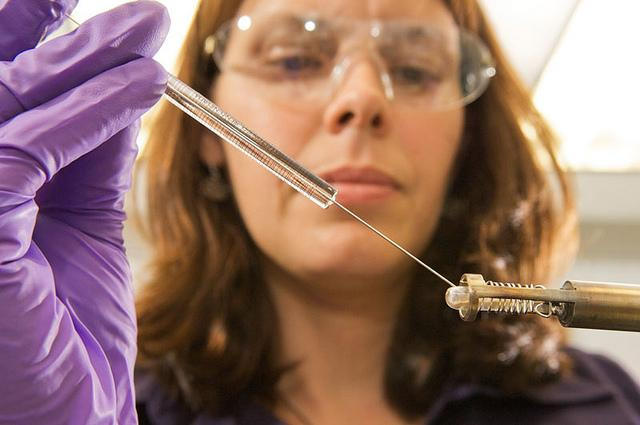Sexual Harassment Rampant in Science, Report Reveals
STEM (science, technology, engineering and mathematics) fields have entered the #MeToo era. GrrlScientist / Flickr Creative Commons
GrrlScientist / Flickr Creative Commons
A new report from the National Academies of Science, Engineering, and Medicine (NASEM) reveals that half of women studying and working in STEM (science, technology, engineering and mathematics) positions at American universities have been subjected to sexual harassment. And, as STAT, an online journal of biotech, pharma and life sciences, reports, “there’s no evidence that current policies are significantly helping to stem the issue.”
Researchers spent two years surveying female students and faculty who were the targets of sexual harassment, compiling data from women at the University of Texas and Pennsylvania State University school systems, representing 10,000 undergraduates, graduate students and female faculty.
As The Washington Post observed, “Between 20 percent and 50 percent of female students in science, engineering and medicine, and more than 50 percent of faculty, said they had experienced harassment.”
Researchers also found that such harassment was more common for engineering and medical students than it was for students in non-science-oriented fields.
STAT notes how the results of this treatment impacted respondents’ personal and professional lives:
Victims interviewed for the report said they had skipped professional meetings and social situations, dropped out of research projects, and left jobs, just to avoid harassment. They described being mortified, devastated, and outraged in some cases. Many didn’t formally report their harassment, often for fear of retaliation. And some who did said the drawn-out proceedings drained them of precious time and energy to do their work.
Some scientists welcomed the reports’ findings. Heidi Lockwood, a professor of philosophy at Southern Connecticut State University, told the Post that the 300-page report is “a spectacular and encyclopedic piece of research and writing, and will no doubt serve as the touchstone for research, policy and advocacy in this area for years to come.”
Others, while grateful for quantitative data to back up their lived experience, questioned whether NASEM was willing to reckon with its own history of harassment accusations. Inder Verma, formerly a cancer biologist at the Salk Institute and editor in chief of the journal Proceedings of the National Academy of Sciences, resigned from both positions in the last few weeks following sexual harassment allegations.
Geoff Marcy, another NASEM member, resigned from his position at the University of California at Berkeley following a 2015 Buzzfeed article that revealed the university investigated student claims of harassment and found that Marcy had violated the school’s conduct policies.
But NASEM has not revoked Verma or Marcy’s memberships. As BethAnn McLaughlin, an assistant professor of neurology at Vanderbilt University, told the Post, the lack of action “certainly undermines the credibility of the National Academy to implement meaningful change.”
Still, the report offers recommendations for moving forward. They include hiring more women and people of color, especially in leadership positions; creating stronger anti-sexual harassment policies and being more transparent about them; providing more support services to victims of sexual harassment; and offering stricter enforcement of federal anti-discrimination policies such as Title VII.
Dig, Root, GrowThis year, we’re all on shaky ground, and the need for independent journalism has never been greater. A new administration is openly attacking free press — and the stakes couldn’t be higher.
Your support is more than a donation. It helps us dig deeper into hidden truths, root out corruption and misinformation, and grow an informed, resilient community.
Independent journalism like Truthdig doesn't just report the news — it helps cultivate a better future.
Your tax-deductible gift powers fearless reporting and uncompromising analysis. Together, we can protect democracy and expose the stories that must be told.
This spring, stand with our journalists.
Dig. Root. Grow. Cultivate a better future.
Donate today.








You need to be a supporter to comment.
There are currently no responses to this article.
Be the first to respond.